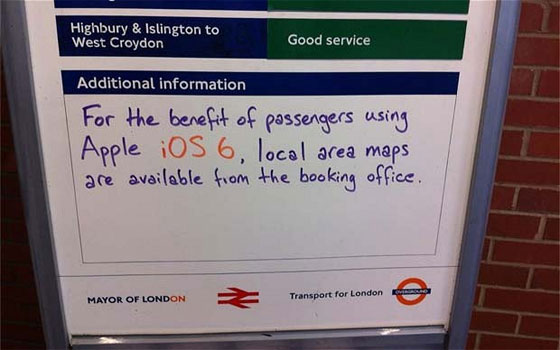Understanding Google My Business & Local Search
GPSBites Interview
I did an interview in GPSBites where I was asked to muse on my background, the current state of mapping, the fate of PNDs & mapping companies and the near future of the intersection of mapping and commerce. Here is a snippet of a much longer interview:
2. You recently published your own survey which was designed to gather feedback from users of the new iPhone map application for iOS6. You stated that you did not believe the recent Apple maps issue was going to affect Apple sales, and in our view Apple must share a similar view as they went so far as publishing an apology on their home page which even recommended customers use rival solutions in the interim.
However, they certainly are facing some challenges. If you were heading up Apple’s cartography division, what recommendations would you make to the company on how they could improve the experience and application moving forwards?
I am not sure that I agree with the premise of the question. It assumes that Apple does not understand cartography and mapping. And that I have significant insights to provide to them.
 Assuming that Apple is stupid or just uneducated is a dangerous assumption. Taking potshots at funky maps is an easy target. Remember it was not that long ago that Google was losing whole towns, repeatedly.
Assuming that Apple is stupid or just uneducated is a dangerous assumption. Taking potshots at funky maps is an easy target. Remember it was not that long ago that Google was losing whole towns, repeatedly.
Mapping is hard. Apple knows full well how hard mapping is and they knew full well that they were going to have difficulties coming into this. When they announced Apple Maps in June 2012 I can not imagine that they would blow that marketing opportunity by announcing that their new Maps product had a “few” problems. NO they went ahead and presented it as the most innovative mapping product ever. Whether it is remains to be seen but in some ways they are where Google with mapping was in 2008, in some ways ahead of that and in some ways behind it. But to assume that they need my advice is to ignore a lot.
Apple has been a late starter in several industries that they ultimately succeeded in leading or developing a very strong market position. They came to the already existing MP3 player market with one device. Over the years as they developed the necessary skills they came to dominate that market. When they entered the phone business NO ONE thought that they could succeed. But their smart phone still sets the standard and has significant market share. They continue to grow their PC market share to a healthy position after being at death’s door in that market. So they know how to succeed as an underdog, how to build out the capacity AND knowledge, and plan for the appropriate growth when they enter an existing and competitive market.
Mapping is in some ways different but in many ways the same. It takes time to build up the institutional knowledge and the people necessary to compete head to head with the likes of Nokia/Navteq and Google. This knowledge can not be built over night and you can’t ramp up all the necessary efforts or staffing in one fell swoop.
Apple could have taken an easier way out of the mapping dilemma and their conflict with Google if they had partnered with TomTom or Mapquest, both of whom already had turn by turn apps working well on the iOS platform. They didn’t. Apple chose to go it alone. The real question that we need to ask (of Apple) is how much of the stack are they intending to own and of the parts that they don’t own, how are they going to get them up to the world class standards that they surely know that they need.
In choosing TeleAtlas, they chose a company with incredible underlying technology but limited resources. Apple has a history of making significant investments in their partners to gain a competitive advantage. By giving TeleAtlas access to the massive amounts of geo data generated by the iOS6 crowd Apple may just have provided TeleAtlas the information that both TeleAtlas and Apple need to compete.
We live in interesting times and Apple’s foray into Mapping promises to make it even more so.
© Copyright 2026 - MIKE BLUMENTHAL, ALL RIGHT RESERVED.



Comments
9 Comments
The bottom line is that Apple’s venture into the map world happened a little too soon — and now it’s consumers who are paying for it.
@Edward
They entered the market with the product when Apple had to enter.
A mapping product does little good in the lab and to get “ground truth” it had to be released into the wild. Until such time as TomTom or Apple increase their streetview drive throughs, the product can best be improved through its increasing use in the real world.
The test is not the first day, the first month or even the first year but whether the product matures at a fast enough rate to be as good as (or nearly as) good as Google’s product. They need it to not be a negative but it doesn’t really have to be clear victor for Apple to have a win in the area.
It took google 8 years to get where they are today. If Apple can come close in 2 years, it will be a major victory and a threat to Google.
And a win for the public.
Apple would have been in better shape working with Open Street Maps than Tom Tom (TeleAtas) in my opinion, based on the maps on Foursquare. The major players in mapping are obviously Google with Nokia/Navteq and MapQuest being 2 and 3 respectively. Nokia/Navteq just struck a big maps deal with Oracle and they also feed MapQuest’s Road Maps and Directions. Slowly but surely I see Nokia/Navteq in a prime position to challenge both Google and Apple.
@Michael
Navteq has always done a better job than TomTom and there is no reason to assume that won’t continue IF they don’t run into capital constraints imposed by Nokia’s decline. Mapping is expensive to get right. And Google has been out investing both TomTom and Navteq up to this point.
Apple does include Open Street Maps in their mapping product, right? I assume that they use whichever data set is better for a given geography.
@Mike
I don’t see OSM referenced in Apple’s attribution link for the providers of content for Apple Maps. However, since OSM is open to anyone Apple may be taking advantage of the resource.
We at Location3 Media stay up to speed with the ever changing local search ecosystem. Your blog is very imformative and we enjoy what insights you bring to the table. Keep up the good work.
@Michael
On this page of Apple Maps credits, Apple noted:
(OSM) OpenStreetMap contributors, http://www.openstreetmap.org/
That is somewhat ambiguous but would seem to me that they are using the maps.
Thanks for the clarification. The list I had on file, some of the page was truncated.
Now I’m curious how long it will take Apple to create/acquire their own review database.
I’ve had great success with the the new map. It was a nice upgrade from the mapquest that I had been using previously.
Comments for this post are closed.